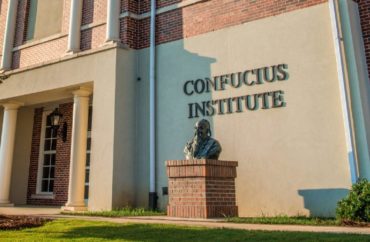
The centers act as a ‘soft power’ for the Communist regime, according to one scholar
Troy University in Alabama continues to maintain its Chinese Communist Party-linked Confucius Institute, while other universities have closed similar centers in recent years.
Alabama A&M University, for example, closed its Confucius Institute in 2021.
Because of their connection to the Chinese Communist Party, Confucius Institutes have drawn scrutiny from scholars, political groups, and Democratic and Republican lawmakers amid rising concerns regarding the Confucius Institutes’ open connections to the dictatorial regime.
These concerns have grown to the point that Congress is writing mitigation measures into federal law. The 2021 National Defense Authorization Act, the U.S. military’s annual budget, specified that the Department of Defense will not provide contracts, grants, or any other funds to universities with operating Confucius Institutes “other than amounts provided directly to students as educational assistance.”
According to Ian Oxnevad, a researcher with the National Association of Scholars, Confucius Institutes act as a form of “soft power” on college campuses. As Oxnevad wrote in an email to The College Fix, the institutes aim to shape “views and norms of another country or target population.” He co-authored a report this summer that found out of the “118 Confucius Institutes that once existed in the United States, 104 have closed or are in the process of doing so.”
The NAS report noted that Troy officials “dispatched Chancellor Jack Hawkins to lobby against an Alabama bill that would have barred state universities from hosting Confucius Institutes” and the university “may have an ulterior motive to retain its Confucius Institute.”
The report suggested this motive is found in Troy University’s agreement with Hanban, the Chinese government agency that funds the institute. The current agreement, set to expire in 2023, specifies that Troy could owe “all the damages incurred,” including “all the investment made,” in an early termination of the agreement.
Oxnevad told The Fix that Confucius Institutes academically “whitewash” certain aspects of Chinese history, including the continued genocide of the Uyghur Muslim population and the “atrocities” of the Great Leap Forward.
MORE: Trump designates Confucius Institute as ‘foreign mission’ of China
The Great Leap Forward was an economic acceleration program launched by the Chinese Communist Party in 1958 which forced centralization of economic resources and prioritized ideological purity over technical expertise. By the end of the program in 1962, the Great Leap Forward had claimed the lives of approximately 45 million civilians, making it one of the largest genocides in documented history.
In his email, Oxnevad called the university’s decision “problematic” and suggested that it raised “a number of questions” about Troy’s motivations to maintain a Confucius Institute despite growing concerns from academics and politicians.
The CCP centers, according to the NAS report, also are behind acts of espionage committed on academic campuses by individuals affiliated with the Confucius Institutes.
The College Fix emailed the public relations team at Troy University’s Confucius Institute twice in the past two weeks, but did not receive a response.
The Fix asked about the opportunities and programs available to students through the Confucius Institute, the university’s motivation in maintaining its Confucius Institute and the mitigation measure the university is taking due to concerns from scholars and lawmakers about the institute’s connection to the CCP.
The Fix also reached out to the university’s media team on October 17 to ask about oversight of the center to ensure the CCP did not use it as a front, but no response was received.
Chancellor Hawkins of Troy University previously said in 2020, in response to criticism from Congressman Mo Brooks about Confucius Institutes, that he has no reason to believe there is undue influence.
“To summarize, our experience with the Confucius Institute to date has been positive, focusing on the teaching of Chinese language and culture, student/faculty exchanges with partner universities, and sending delegations to tour China,” Hawkins wrote, as reported by AL.com. “The CI at Troy University has neither input to nor influence over matters of academic administration at Troy University, including research activities.”
“In addition, as we told representatives of the Federal Bureau of Investigation in two interviews in 2019, we have seen no evidence of undue political influence from the Chinese government nor has there been any evidence of intellectual theft,” Hawkins said.
MORE: The battle over Chinese influence on American campuses if far from over
IMAGE: Troy University





Please join the conversation about our stories on Facebook, Twitter, Instagram, Reddit, MeWe, Rumble, Gab, Minds and Gettr.